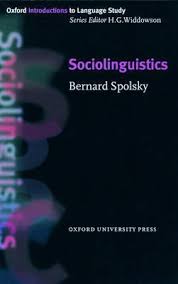Sociolinguistics by Bernard Spolsky

Describing this manual, I would like to pay special attention to the personality of the author. Bernard Spolski has been holding a teaching position at the University of Montreal since 1996, but his interest in sociolinguistics originated much earlier. Spolski was a high school teacher in a small town in New Zealand. He was attracted by the incredible ability of some Maori students, indigenous people of New Zealand, to speak two languages as native. This phenomenon is known as bilingualism. He was plagued by the question: "Why do Māori boys write essays in English better than pupils from English-speaking countries?" Bernard, as you might have guessed, found the answer to his question. You can find it too - just read chapter 5. Bilinguals and bilingualism.
Language is a social phenomenon capable to change under the influence of society, that is why the biggest part of the manual is devoted to the consideration of social factors that can change our speech and adjust to a specific social context. Rules of politeness adopted in certain communities, the constantly emerging slang, social status, even gender - all this is reflected in one way or another in the language we use.
In addition to this, Bernard Spolski explains what is social multilingualism, diglossia, Creole languages and pidgin languages, how language and politics, language and ethnic identity are linked, argues on the subject of the origin of dialects.



